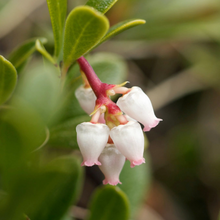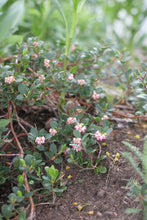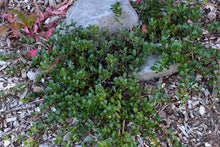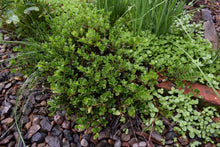
Arctostaphylos uva-ursi
Kinnikinnick is a versatile low-growing shrub that functions extraordinarily as a dynamic groundcover in exposed, sunny, dry areas. In spring, this trailing evergreen shoots off cheery new growth with a lemony-green hue, followed by small white to pink, urn-shaped flowers. By late summer the foliage shifts to a reddish purple and the flowers mature into small red or orange berries that persist into winter. Kinnikinnick is used extensively by insects and wildlife and has been recognized for its medicinal properties by native peoples for thousands of years.
- Plant type/canopy layer: evergreen, perennial, small shrub (prostrate)
- Size at maturity: 5-8" tall, 2-5' wide
- Light requirements: full sun
- Moisture requirements: dry to moist soil
- Growth rate/ease: fast growth rate, easy to grow
- Bloom time: April - July
- Wildlife support: flowers attract and supports hummingbirds, adult butterflies, bees and other insect pollinators; overall plant attracts and supports, beneficial and pest eating insects and is a caterpillar host plant and larval food source
- Native habitat/range: thrives in a wide range of habitats including ocean bluffs, sandy flats, rocky hillsides, mixed woods and coniferous forests, up to 2800m, in the Pacific Northwest from Alaska to northern California, as well across most northern states and Canada. Portland Plant List - yes.
- Special features & uses: evergreen; supports hummingbirds; medicinally, it contains the glycoside arbutin, which has antimicrobial properties and acts as a mild diuretic; landscape uses include as a groundcover in pollinator gardens and rock garden and erosion control
Gardening with Kinnikinnick: Kinnikinnick is ideal for sunny locations with soils that are nutrient-poor, acidic, rocky or sandy and have limited water input. It is extremely tolerant of the elements, including salt and wind and can be used on tough exposed slopes and other sunny problem areas. It will also cascade nicely over ornamental rocks and borders.
Photo Credit 1: "Arctostaphylos uva-ursi" by Jörg Hempel is licensed under CC BY-SA 2.0.
Photo Credit 2: Karli Del Biondo, Beetles and Bees
Photo Credit 3: Tara Lemezis, Tiny Seed Photography
Photo Credit 4: Nikkie West, Sparrowhawk Native Plants







